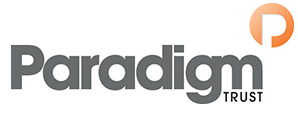Maths Mastery Matters
Paradigm Trust takes a mastery approach to teaching maths, ensuring its pupils and students revisit the same core areas throughout their schooling, to achieve a level of knowledge which gives them greater capabilities in the subject.

Lyndsay Collin is a mathematics teacher and has previously been Maths Network Coordinator at Ipswich Academy, the Trust’s secondary school. Lyndsay did her teacher training with Paradigm and is now the Trust’s NCETM maths hub specialist: “With the Maths Mastery system, depth of knowledge is far more important than breadth,” she says. “By using a consistent approach to teaching the subject, from EYFS through to KS4, children moving through the school can grasp the fundamentals and build on them, every time they revisit.“
Evaluation and improvement is not limited to individual schools. To maximise the effectiveness of teaching at Paradigm, maths leads from across the Trust’s network meet regularly to review the way the subject is being taught and exchange best practice. Subject knowledge is monitored to deal with common misconceptions, and thanks to the Trust’s ‘Open Classroom’ policy, learning walks allow subject leads to see what support is needed.
Lyndsay continues: “There is a real ‘talk for learning’ ethos across the curriculum at Paradigm, so our maths lessons involve a lot of conversation in the classroom. A key technique to encourage this at Ipswich Academy is the Agree, Build, Challenge (ABC) model which teachers use to coax enhanced discussion and thinking. For Agree, teachers give students two answers and they have to say which they agree with, then explain their rationale to justify their answer. Build requires the teacher to ask a student to build upon another student’s answer, elaborating or giving new information. Challenge involves the teacher asking a student whether they would like to challenge each other’s answers and opinions in a positive and constructive way.” A similar model is used in the primaries, adapted for the level of the pupils.
Paradigm Trust prioritises regular, subject specific CPD. To be able to deliver the curriculum effectively, it’s not just teachers who need to have a strong grasp of the subject – teaching assistants supporting SEND students need to be assured in their own maths knowledge too. To achieve this, and support members of staff who may have gaps in their knowledge, Paradigm Trust has put measures into place including termly subject knowledge enhancements sessions for TAs. This was initially trialled in the secondary school, Ipswich Academy, and when it proved successful, the Trust rolled it out to its primary schools in Suffolk and London.
The Trust works hard to ensure no child is left behind in any subject, and in maths, if a pupil is struggling and experiencing maths anxiety, there are a range of techniques which a teacher can employ.
Lyndsay Collin explains; “ As part of our SSAT sessions recently we have been exploring the strategies that come from students learning and feeding back to each other – however these are just a small subset of strategies that we use to ensure students don’t fall behind. Sitting them with more confident students is just one of the ways that we can do this. We also provide backwards fading work to provide scaffolding and ensure we model problems and talk them through with the students and ensure that they understand using Assessment For Learning (AFL) before getting them to complete independent work, we then check our students work as they are working and give live feedback either to individuals or as a group depending on the need. We use manipulatives within the classroom to help support the learning of students who struggle with maths, as this can build their conceptual understanding before we move onto a more abstract concept.
“Teachers then check students’ work as they are working and give live feedback either to individuals or as a group depending on the need. They also use manipulatives within the classroom to help support the learning of students that struggle with maths, as this can build their conceptual understanding before moving onto a more abstract concept.”
At Ipswich Academy there is also a dedicated support centre, where pupils not coping with mainstream classes can take part in smaller group sessions. In more extreme cases where children actively avoid maths and may use distraction techniques, the Paradigm behaviour policy comes into play. Teachers work with the attendance team, teaching assistants, the pupil and their family to build a trusting and supportive atmosphere around the subject.
Having a strong foundation in maths gives a pupil a good advantage when they come to the more advanced topics at secondary school. This is why Paradigm Trust places a particular emphasis on learning the language of maths. From when they first join primary school, pupils’ mathematics vocabulary is built to grow confidence in the use of terms such as coefficient, highest common factor and lowest common denominator. This particular focus enables pupils to have easier conversations around the subject and access to answering examination questions when they reach their GCSE studies.
The most recent progress 8 score at Ipswich Academy was a strong +0.29 and Key Stage 3 attainment is above the national average. The number of students achieving between level 4 and level 9 at Key Stage 4 is also increasing. Across the five primaries 71% are attaining level 4+ and 53.7% are working at 5+. Everything the Trust does is evidence based, and these outcomes are solid proof that the approach it is taking with maths is delivering great results for its pupils.
